Joonho Lee Awarded the 2020 Justin Jankunas Doctoral Dissertation Award | |
| April 15, 2020 | |
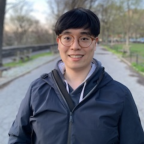
| Dr. Joonho Lee earned his B.S. in chemistry and physics in 2013 from Pohang University of Science and Technology, South Korea. He then moved to the United States to study as a Kwanjeong Educational Foundation fellow at Caltech where he earned his M.S. in chemistry under Prof. Thomas F. Miller III. Subsequently, he moved to UC Berkeley in 2015 and completed his Ph.D. work in chemistry in 2019 under Prof. Martin P. Head-Gordon. … Read More |
Prof. Martin Head-Gordon Wins the 2020 Schrödinger Medal of WATOC! | |
| February 15, 2020 | |
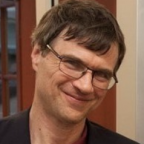
| Q-Chem developer and Scientific Advisor, Martin Head-Gordon, has been informed that he is to receive the 2020 Schrödinger Medal of WATOC. This is awarded every year to one "outstanding theoretical and computational chemist." The medalist is selected by the WATOC Board through an electronic ballot. WATOC members can suggest candidates by email… Read More |
John Herbert - Recipient of 2020 Edward W. Morley Award | |
| January 27, 2020 | |

| Congratulations to Q-Chem developer and Board Member, John Herbert, who is the recipient of the 2020 Edward W. Morley Award from the Cleveland Section of the American Chemical Society! The award recognizes significant contributions to chemistry through advances in research, teaching, engineering, research administration and public service, outstanding service to humanity, or to industrial… Read More |
Q-Chem is Hiring | |
| November 1, 2019 | |
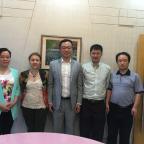
| Q-CHEM IS HIRING: Research Associate in Computational Chemistry: |
Anna Krylov is Awarded the 2020 Earle K. Plyler Prize for Molecular Spectroscopy & Dynamics | |
| September 30, 2019 | |

| Congratulations to Q-Chem President and developer, Anna Krylov, on being awarded the 2020 Earle K. Plyler Prize for Molecular Spectroscopy & Dynamics "For her innovative work developing high accuracy electronic structure theory to inspire interpretation of spectroscopy of radicals, excited states, and ionization resonances in small molecules, biomolecules, and condensed phase solutes." This award, sponsored by… Read More |
Q-Chem Has a New President | |
| September 30, 2019 | |

| We are proud to announce that our board member/developer, Prof. Anna Krylov, has taken the reins as President of Q-Chem. We look forward to much growth and prosperity under her wise leadership! We would also like to take this time to send out our immense appreciation to our former President, Prof. Peter Gill, for all of his years of excellent service and leadership. We feel so lucky and honored to have such an amazing team here at Q-Chem. There is none better. Here's… Read More |
Thomas Jagau Receives European Research Council Starting Grant | |
| September 30, 2019 | |

| Congratulations to Q-Chem developer, Thomas Jagau, of the University of Munich, Germany, who has landed a European Research Council 2019 Starting Grant! Starting Grants are awarded to early-career researchers of any nationality with two to seven years of experience following completion of their PhD and having a scientific track record that shows great promise. Their research must be conducted in a public or… Read More |
Thomas Jagau Awarded the Hellmann-Award | |
| September 26, 2019 | |

| Congratulations to Q-Chem developer, Thomas Jagau, on being awarded the Hans G. A. Hellmann-Prize for Theoretical Chemistry for young German-speaking theoretical chemists! This award commemorates a pioneer of Quantum Chemistry, Hans G. A. Hellmann (1903 - 1938). It is periodically awarded to promising young German theoretical chemists to honor their accomplishments.
|
Prof. Shirin Faraji Joins the Q-Chem Board of Directors | |
| July 27, 2019 | |

| Q-Chem is proud to announce our newest board member, Dr. Shirin Faraji of the University of Groningen. Welcome, Shirin! |
Prof. Martin Head-Gordon elected to Royal Society of the UK | |
| June 7, 2019 | |

| Congratulations to Q-Chem Advisor and developer, Prof. Martin Head-Gordon, of the University of California at Berkeley, on being elected to the extremely prestigious Royal Society of the UK. Posted citation reads, "Head-Gordon has advanced quantum chemistry in three critical components - theory, algorithms, and software. This includes major advances in foundational quantum mechanical wavefunction methods, practical density functional theory and the interpretation of quantum… Read More |
Q-Chem Developer Thomas Jagau Awarded 2023 Dirac Award |
| February 16, 2023 |
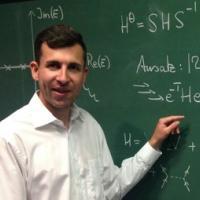
|
Q-Chem is very pleased to congratulate Thomas Jagau on his receipt of the prestigious 2023 Dirac Medal! The Dirac Medal is awarded annually to an… Read More |
Q-Chem Developer Debashree Ghosh Awarded 2022 Walter Kohn Prize |
| December 15, 2022 |
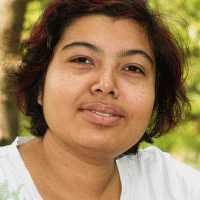
|
Q-Chem is pleased to congratulate Debashree Ghosh on being awarded the 2022 Walter Kohn Prize! She is recognized… Read More |
Q-Chem 6.0.2 Is Released |
| December 13, 2022 |
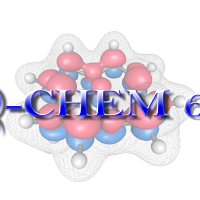
|
Q-Chem is pleased to introduce our latest release, Q-Chem 6.0.2. It includes several bugfixes and improvements to the recent 6.0 release. For a full list of updates, fixes, and resolved issues … Read More |
Q-Chem's 2022 Holiday Sale! |
| November 1, 2022 |

|
Happy holidays! This year, we're combining Q-Chem's traditional November and December sales events for double the holiday cheer! A 12% discount will be applied to all license orders and license… Read More |
Call For Nominations: 2023 Michael Wormit Awards |
| October 17, 2022 |

|
We are now accepting nomination submissions for the 2023 Michael Wormit Award. This award recognizes excellence in the development of new methods and algorithms in the area of electronic structure… Read More |